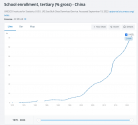Most of the growth is happening away from the T1s now. I recall see many of the T1s posting 1-2% growths. Some of this is due to policies to actively direct internal migration away from these T1s.
Not to mention, there is a student surplus right now during the vast expansion in university graduates as % of total population. In this case, the expansion is front-running - there are many more students than there are jobs because of how quickly student populations expanded but this will self-correct over time. This is just like how HSR was mostly empty when it was initially expanding but is now sustainable.
In the 2010s, you had very few university graduates, it was obviously a huge advantage in the job market. China was at 72% in 2022, so it's obviously not an advantage to be university-educated anymore when literally everyone else is too. At the same time just because the trend is going this way right at this moment, does not mean it will be sustained forever. 80-90% is basically the max for developed countries world wide. It structurally can't go any higher. At that point there will no more of this increasing surplus and there will finally be time for the Chinese economy to digest these workers and catch up with creation of jobs requiring such skills.
Yes, it sucks for those who are front-running, but the conclusion isn't China is doomed forever. Or to put it another way, it's always darkest before dawn.
edit: For context, it took China 10 years to go from 30% to 72% (2012-2022). It took the USA 50 years (1950-2000). Think about how much more time the old developed countries had to digest these seismic changes in society.
View attachment 124781
I would never worry about China with this rate of growth in tertiary education enrollment. It signals a big ascension.
This rate of tertiary enrollment growth that is happening in China currently has already happened in SK and Taiwan,
increasing fivefold in around just 20 years, a few decades ago, with a similarly high proportion of STEM graduates.
It coincided precisely with Taiwan becoming a high-tech industrial economy and the rise of TSMC.
And a similar total transformation of the entire economy into high-tech was also recorded in SK during that period.
Meanwhile, during the same period, Taiwan's GDP increased by 400%, and SK's GDP was around 1500%.
And no business wants to create jobs and go into new advanced industries
without people being present already.
It goes like this: Some company notices this increase in the STEM labor pool on the market, enough for them to take action, and only then create additional jobs requiring their advanced skills.
That's already what's happening in companies like Huawei and BYD at a massive scale.
For China, this process and the urbanization process (this takes slightly longer, around 30 years) would end both by the mid-2030s, exciting times.
So, until then, I expect the high youth unemployment ratio to persist, but it just means higher waiting for a job,
And then new graduates also wait for jobs, it doesn't mean that you won't get a job at all.
I don't know how it was in SK and Taiwan during their transitions (probably similar), but it's normal.
Yeah, I managed to find out about SK, it is similar to China now, it rose from 6% to 14% during their tertiary enrollment 'explosion', from the early 80s to the mid-2000s,
and then it fell back again gradually from that point onward to around 4% today.
Look at this chart, the higher the youth unemployment ratio in China was, the higher its GDP was.
During the same period of this chart of youth unemployment trend,
the Chinese nominal GDP also rose 45 times!

